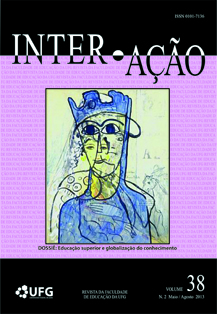POLÍTICAS DE EDUCACIÓN SUPERIOR Y PRODUCCIÓN DE CONOCIMIENTOS EN MÉXICO (1980-2011)
DOI:
https://doi.org/10.5216/ia.v38i2.26111Keywords:
Educación Superior, Investigación, Producción de conocimientoAbstract
En este artículo se revisan diversos procesos e indicadores relacionados con la educación superior (ES) y la producción de conocimientos en México durante las últimas tres décadas. Los datos analizados indican que, a pesar de la rápida expansión de la ES mexicana durante el período 1980-2011, la productividad en investigación y la producción de conocimientos es muy baja, no sólo en comparación con las naciones más avanzadas, sino con países de la región. El crecimiento acelerado de la ES es un fenómeno mundial, aunque es más visible en algunas regiones que en otras. Comparativamente, México y Brasil muestran un fuerte incremento en términos absolutos, pero todavía sus niveles de cobertura son de tipo medio. Los indicadores que relacionan la capacidad científica, tecnológica y de innovación, en el caso de México, muestran una baja inversión con relación al PIB. Los estudiantes de posgrado han aumentado significativamente en los últimos años, pero siguen siendo pocos con respecto al número total. La cantidad de doctores graduados anualmente en México representa una cuarta parte de los graduados en Brasil. La comunidad de investigadores es muy reducida, tanto a nivel mundial como regional. Pese al aumento de artículos publicados en revistas internacionales, su número es aún pequeño. El coeficiente de inventiva presenta, además, una tendencia a la baja. Aun cuando los indicadores son insuficientes y limitados, hay lugar para el optimismo moderado debido al crecimiento en el número de estudiantes en ES y posgrado, así como las perspectivas de mayor inversión gubernamental en ciencia, tecnología e innovación.Downloads
Downloads
Published
How to Cite
Issue
Section
License
Inter-Ação uses the Creative Commons Attribution 4.0 License for Open Access Journals (Open Archives Initiative - OAI) as the basis for the transfer of rights. Open access means making documents available on the Internet free of charge, so that users can read, download, copy, distribute, print, search, or link to the full text of documents, process them for indexing, use them as input data for software programs, or use them for any other lawful purpose, without financial, legal, or technical barriers.
Authors publishing in this journal agree to the following conditions:
1) Authors retain copyright and grant the journal the right of first publication, with the work simultaneously licensed under the Creative Commons Attribution License, which permits redistribution of the work with attribution and first publication in this journal.
2) Authors are permitted to enter into additional, separate agreements for non-exclusive distribution of the version of the work published in this journal (e.g., for publication in an institutional repository or as a book chapter), with attribution and first publication in this journal.
3) Authors are permitted and encouraged to publish and distribute their work online (e.g. in institutional repositories or on their home page) at any time before or during the editorial process, as this may generate productive changes as well as increase the impact and citation of the published work.















